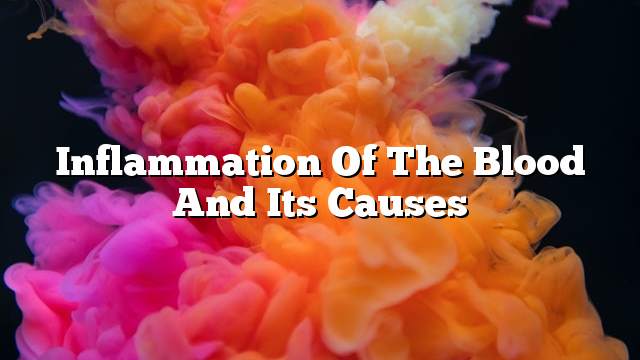Inflammation of blood
Inflammation or also known as sepsis, is a serious medical condition that is threatening the life of the patient resulting from an overwhelming immune response to a certain inflammation, causing tissue breakdown and organ failure and leading to death. Scientists have differed on its definition but its best medical explanation is The case of poisoning caused by the presence of the causative agent and toxicity in the blood.
This condition occurs when the human body begins to release some of the immune chemicals to the blood dramatically to stimulate the immune system, which works to attack the pathogens of the bacterial disease, but this irritates the immune system throughout the body is uncontrolled and this leads to damage to tissues and organs.
This high immune response harms organs, as blood in the blood vessels surrounding the organs and limbs coagulate, thus depriving them of nutrition and oxygen. In severe cases of illness more than one member is disabled together leading to major problems and death.
Symptoms of inflammation of the blood
Because blood poisoning is possible to begin anywhere in the body, it has a wide range of symptoms:
- The first symptoms that appear on the patient are the acceleration of the self to more than 20 / min.
- Changes in the patient’s mental state.
- Change in temperature, either high and shiver, or sharp drop in it.
- Limit urine and reduce it.
- Heartbeat accelerates to more than 90 minutes.
- Fatigue and vomiting.
- Diarrhea or bowel obstruction.
- Edema, which is the swelling of the body resulting from the accumulation of fluids in it.
- Low blood pressure.
- Decreased number of platelets.
- High blood sugar level.
- High number of white blood cells.
- Low blood oxygenation rate.
- Slow tissue re-perfusion.
- In severe cases or so-called toxic shock, this disease is accompanied by several major symptoms, in addition to a severe reduction in blood pressure, which leads to the type of shock, which works to waste members of the body important and sensitive to its vital functions, especially the lungs, kidneys, In addition to the liver.
Causes and risk factors of inflammation of the blood
There are many reasons for the occurrence of blood infections, the most important of which is bacterial infections. Less important are viral and fungal infections, such as pneumonia, nephritis, abdominal cavity infection, high or low risk factors in age, weak immune system, Living and living with medical devices such as respiratory tubes, etc., severe injury to wounds or burns, and diabetics.
Diagnosis of the disease
Diagnosis of this condition is complicated because of the large similarity between the symptoms caused by this condition and many other symptoms of the disease, so the doctor is subject to the patient usually for various tests for the detection and identification of the disease accurately, and these tests:
- Blood tests:
- To detect bacterial infection.
- To detect impaired liver and kidney function.
- To detect the disorder of blood clotting factors.
- Oxidation tests.
- To detect the imbalance of minerals and salts.
- Other laboratory tests:
- Urine tests.
- Examine wound secretions if the patient is injured.
- Check pulmonary secretions.
- Radiation images:
- X-rays, to detect special infections of the bra to avoid exposing the patient to radiation significantly.
- Class images, to reveal the lesions in the abdominal area more clearly.
- Television imaging, to detect infections in the liver or ovaries.
- MRI helps in detecting soft tissue infections.
disease treatment
The treatment of this condition requires direct and immediate medical intervention and rapid diagnosis in order to reduce its complications. In chronic conditions, which seriously threaten the life of the patient, many necessary treatments and assistance are performed, including maintaining the integrity of the breath and maintaining the heartbeat , It is therapeutic procedures that offer the patient :,null,
- pharmaceutical:
- Total antibiotic, where the doctor begins to give the patient this type of antibiotics until the identification of the main cause is given the appropriate antibiotic.
- Vascular lasers, to try to raise blood pressure.
- Low doses of corticosteroids, to reduce the severity of the immune system.
- Insulin, to reduce or maintain blood sugar level.
- Immune system inhibitors.
- Pain relievers and reducers.
- Supporting treatments:
- Large amounts of intravenous fluid.
- Mechanical respirators.
- Dialysis if necessary.
- Surgery to remove the causative inflammation.
The disease is considered a fatal disease. The faster the patient gets to the doctor, the greater the chances of survival. However, the proportion of patients who die from it if they are diagnosed close to thirty percent of those with severe poisoning, while the proportion of patients who reach the stage of toxic shock, Nearly 60 percent.
